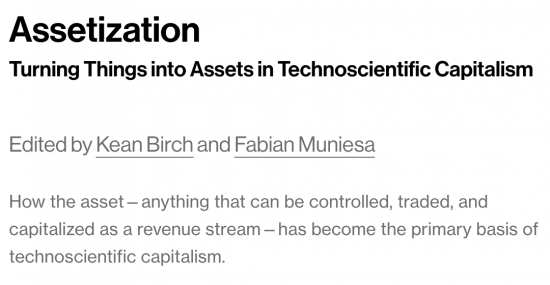I noticed a new book announced by MIT Press yesterday. It is:
As the blurb says:
In this book, scholars from a range of disciplines argue that the asset–meaning anything that can be controlled, traded, and capitalized as a revenue stream–has become the primary basis of technoscientific capitalism. An asset can be an object or an experience, a sum of money or a life form, a patent or a bodily function. A process of assetization prevails, imposing investment and return as the key rationale, and overtaking commodification and its speculative logic. Although assets can be bought and sold, the point is to get a durable economic rent from them rather than make a killing on the market. Assetization examines how assets are constructed and how a variety of things can be turned into assets, analyzing the interests, activities, skills, organizations, and relations entangled in this process.
The contributors consider the assetization of knowledge, including patents, personal data, and biomedical innovation; of infrastructure, including railways and energy; of nature, including mineral deposits, agricultural seeds, and “natural capital”; and of publics, including such public goods as higher education and “monetizable social ills.” Taken together, the chapters show the usefulness of assetization as an analytical tool and as an element in the critique of capitalism.
Let me be clear, I have not read the book. I am not offering anything more than this blurb right now. But what I can say is that the issue is a real one.
The fact is that assets are 'created'. Many are synthetic. They transfer value, nonetheless.
And it can be said that the creation of these 'assets' is now the focus of modern capitalism.
This then defines modern capitalism as a mechanism for rent extraction, and not profit-making.
And what that means is that value creation has ceased to be what markets are about.
No wonder we are in the end-times for neoliberalism.
The big question does, however, remain what the alternative might be. When the asset owning class are aligned in seeking to preserve their privilege, and manage to align many others with them through pension funds and such arrangements, breaking this pattern is one of the great challenges we face.
Thanks for reading this post.
You can share this post on social media of your choice by clicking these icons:
You can subscribe to this blog's daily email here.
And if you would like to support this blog you can, here:




Would the term “Abstractisation” not be more accurate. The difficulty comes with intellectual property; with thoughts; with elusive, protean phenomena that have no location, and which know no borders. These are the ideal world for rentierism, for abstractisation opens the door to the widest conceivable opportunity for exploitation, while increasing exponentially the difficulty in identifying, in measuring results, in taxing, or fixing who is responsible, or for what….
I have always thought the rot set in with the development of the concept of profit, when accountants decided to detach it from a fixed venture, and invent the proposition that you can both identify a profit accurately in a changing environment, while embracing the concept of the open-ended ‘going concern’ (but going where, on what assumptions, or for how long?); profit not considered as the product of a specific, closed project with a limited life span.
If this isn’t a pretext for dystopia I don’t know what it is.
“Agricultural seeds” that theft has already been committed to some degree by Monsanto. As for “a life form”, “a bodily function”, who do they think they’re kidding?
This will be an interesting read. However, I wonder whether it represents something fundamentally new in the history of capitalism. Couldn’t “[getting] a durable economic rent from [assets] rather than [making] a killing on the market” describe the behavior of U.S. railroads or the Standard Oil Company in the nineteenth century?
In other words, is assetization fundamentally different from monopolization (or what Marx would have called centralization of capital) or is it a contemporary evolutionary aspect of those tendencies?
I suggest it is very different
One controlled markets
The other extracts value from society